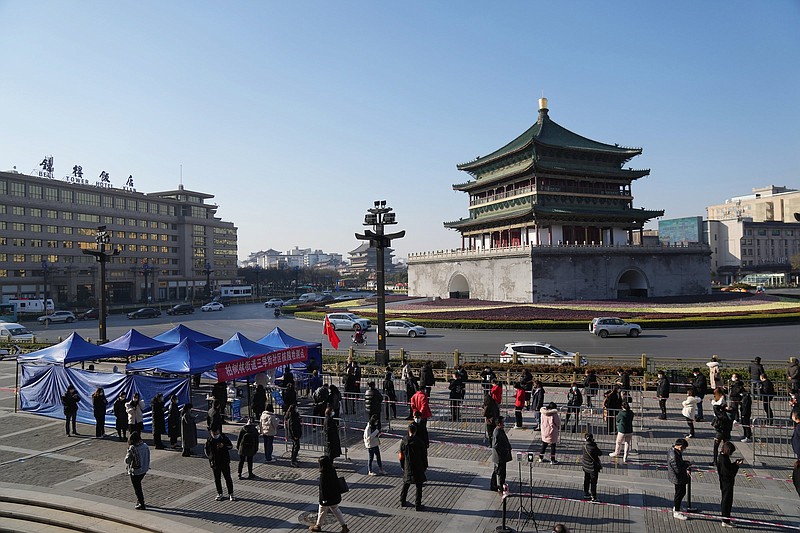BEIJING -- China plunged a city of 13 million people into lockdown on Thursday to stamp out an increase in coronavirus infections, as the country doubles down on its "zero tolerance" policy just weeks before it is set to host the Winter Olympics.
The restrictions in the northeastern city of Xi'an took effect at midnight Wednesday, with no word on when they might be lifted.
One person from each household will be allowed out every two days to buy household necessities, a government order said. Other family members were required to stay at home, although the rule was not being rigorously enforced, according to social media posts. People who happened to be staying in hotels became stuck.
There was no word on whether the new cases were of the recently identified omicron variant that appears more contagious and is driving surges in many parts of the world -- or the previous version, delta.
While China has reported no omicron cases so far in Xi'an, the city reported an additional 63 locally transmitted cases on Thursday, pushing the city's total to at least 211 over the past week.
Though the latest outbreak is about 620 miles southwest of the Olympic host city of Beijing, any sign that the pandemic might be worsening in China will raise questions about whether and how it will manage to welcome thousands when the games open on Feb. 4.
[CORONAVIRUS: Click here for our complete coverage » arkansasonline.com/coronavirus]
On the one hand, there is a tremendous amount of national pride and investment riding on the Olympics and few would want a cancellation, postponement or dramatic reimagining at this late stage.
On the other, Chinese authorities have adopted draconian measures throughout the pandemic under their policy of seeking to stamp out every last case. That "zero tolerance" policy, which has led to frequent lockdowns, universal masking and mass testing, has not been entirely successful.
It has resulted in widespread disruptions to travel and trade, but Beijing credits it with largely containing the spread of the virus. Overall, China has reported 4,636 deaths and 100,644 cases of covid-19.
'SMALL RAY OF SUNLIGHT'
Preliminary data suggests that people with the omicron variant of the coronavirus are 50% to 70% less likely to be hospitalized than those with the delta strain, Britain's public health agency announced Thursday in a finding that one researcher called "a small ray of sunlight."
The findings from the U.K. Health Security Agency add to emerging evidence that omicron produces milder illness than other variants. But scientists caution that any reductions in severity must be weighed against the fact that omicron spreads much faster than delta and is better at evading vaccines.
Based on cases in the U.K., a person with omicron is estimated to be 31% to 45% less likely to go to a hospital emergency room than someone with delta, "and 50 to 70% less likely to be admitted to hospital," the agency said.
It cautioned that the analysis is "preliminary and highly uncertain" because of the small number of omicron patients in hospitals and the fact that most were in younger age groups. As of Dec. 20, 132 people had been admitted to U.K. hospitals with confirmed omicron. Fourteen of them died, all between the ages of 52 and 96.
The signs that omicron may cause less severe disease than delta also align with lab data suggesting omicron does not grow as well in cells derived from lungs, said Dr. Jonathan Li, director of the Harvard/Brigham Virology Specialty Laboratory.
The findings add to similar data from South Africa, added Dr. Bruce Walker, director of the Ragon Institute of Massachusetts General Hospital, the Massachusetts Institute of Technology and Harvard.
Walker said there are still unknowns, such as the relative severity of omicron in someone who's been vaccinated compared with someone who's had covid-19 before or someone who is unvaccinated and has not had the disease.
Vaccination remains crucial, he said.
"The bottom line is the best way that somebody can prepare for this new wave is to get immunized, and if somebody is already immunized, to get a booster," said Walker, who is an investigator with the Howard Hughes Medical Institute.
The British agency's research said the protection a vaccine booster shot gives against symptomatic omicron infection appears to wane after about 10 weeks, though protection against hospitalization and severe disease is likely to hold up for longer.
The analysis "shows an encouraging early signal that people who contract the omicron variant may be at a relatively lower risk of hospitalization than those who contract other variants," said Jenny Harries, chief executive of the U.K. Health Security Agency.
But she added that "cases are currently very high in the U.K., and even a relatively low proportion requiring hospitalization could result in a significant number of people becoming seriously ill."
Britain reported nearly 120,000 lab-confirmed covid-19 cases on Thursday, the highest yet during the pandemic and the second day the number has topped 100,000.
Britain's Conservative government this month reinstated rules requiring masks in shops and ordered people to show proof of vaccination or a negative coronavirus test before entering nightclubs and other crowded venues in an attempt to slow omicron's spread.
The government said Thursday that it would not impose any new restrictions before Christmas, but might do so soon after.
Information for this article was contributed by Jill Lawless, Laura Ungar and staff of The Associated Press.
Gallery: Coronavirus scenes, 12-23-2021
